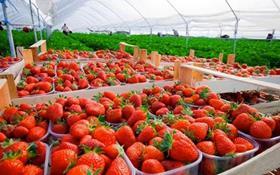
Croatia began the process of joining the European Union 12 years ago. Is membership still the right thing to do, in your opinion?
Stanko Barbarić: It is very difficult to say – it depends on which branch of the Croatian economy we are talking about. For tourism it is probably very good, while the industrial sector could say the opposite. The agricultural sector is somewhere in between these two. Unfortunately, Croatia is joining the EU at a time of economic crisis, and many resources that were available in times of prosperity are now not.
How will EU membership affect Croatia’s fruit exports? Can Croatian producers make an impact on large EU markets?
SB: Croatia’s fruit sector already has open access to the EU market. Unfortunately, production volumes are not so big, and it is hard to fulfil the needs of the EU market. For sure, after joining Croatia will be much more interesting to EU customers. I hope we will find a way to benefit from that change, especially for products such as satsuma tangerines, strawberries, apples, plums and leafy vegetables. Our geographic position and climate will give us some advantages.
How will membership change Croatia’s domestic outlook? Can small local producers stay competitive in a more open market?

SB: It is impossible to say that right now. Potentially, a big problem is that over 60 per cent of Croatia’s retail market share is owned by Austrian and German supermarket chains. They already have supply chains set up in Austria and there is the possibility that they could simply extend these supply chains into Croatia – Zagreb is less than two hours’ drive from Austria.
However, fresh fruit and vegetables are sensitive products and customers are similarly sensitive about their origin. Small producers, as in any country in the world, can offer some added value when you compare them with bigger producers – especially in Mediterranean countries, where people have a strong desire to buy fresh produce at the market.
Are there any particular Croatian fruit or vegetable varieties that we should be looking out for?
SB: Yes, I think there are. Croatian satsuma tangerines start earlier than Spanish or Greek and are quite different in taste. Meanwhile, a lot of sun and good technology have put Croatian strawberries in a very good position on the Scandinavian market.
How is Fragaria preparing for the accession?
SB: In the past few years our main focus was on the quality of our products. The weakest point of Croatian fruit and vegetable production was, and still is, post-harvest technology, but we have invested a lot in post-harvest facilities such as cold storage capacity and grading machines.
Up until 2009 our entire turnover was drawn from the Croatian market. Since then, we have shifted our focus to foreign markets. In 2012 exports made up 24 per cent of Fragaria’s turnover. We mostly export strawberries, apples, gherkins, tangerines and raspberries.
What role can Fragaria play in improving Croatia’s export trade, as an exporter and as a consultant?
SB: Fragaria can help coordinate producers and collect products, and that is what we also do domestically. We organise co-operatives, provide growers with technical assistance, and educate them constantly on EU quality demands.
Are there any particular EU markets that you will be targeting?
SB: At this moment northern EU markets are our focus. These markets are highly organised and are very demanding regarding quality, but are also very rewarding.



